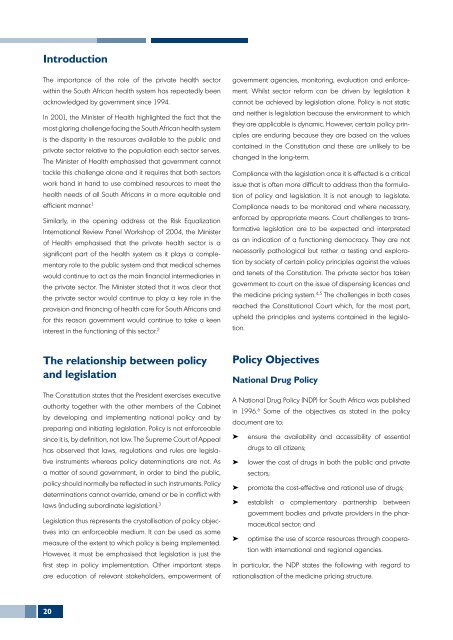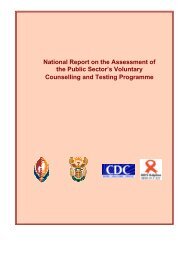SAHR 2007 - Health Systems Trust
SAHR 2007 - Health Systems Trust
SAHR 2007 - Health Systems Trust
You also want an ePaper? Increase the reach of your titles
YUMPU automatically turns print PDFs into web optimized ePapers that Google loves.
Introduction<br />
The importance of the role of the private health sector<br />
within the South African health system has repeatedly been<br />
acknowledged by government since 1994.<br />
In 2001, the Minister of <strong>Health</strong> highlighted the fact that the<br />
most glaring challenge facing the South African health system<br />
is the disparity in the resources available to the public and<br />
private sector relative to the population each sector serves.<br />
The Minister of <strong>Health</strong> emphasised that government cannot<br />
tackle this challenge alone and it requires that both sectors<br />
work hand in hand to use combined resources to meet the<br />
health needs of all South Africans in a more equitable and<br />
efficient manner. 1<br />
Similarly, in the opening address at the Risk Equalization<br />
International Review Panel Workshop of 2004, the Minister<br />
of <strong>Health</strong> emphasised that the private health sector is a<br />
significant part of the health system as it plays a complementary<br />
role to the public system and that medical schemes<br />
would continue to act as the main financial intermediaries in<br />
the private sector. The Minister stated that it was clear that<br />
the private sector would continue to play a key role in the<br />
provision and financing of health care for South Africans and<br />
for this reason government would continue to take a keen<br />
interest in the functioning of this sector. 2<br />
government agencies, monitoring, evaluation and enforcement.<br />
Whilst sector reform can be driven by legislation it<br />
cannot be achieved by legislation alone. Policy is not static<br />
and neither is legislation because the environment to which<br />
they are applicable is dynamic. However, certain policy principles<br />
are enduring because they are based on the values<br />
contained in the Constitution and these are unlikely to be<br />
changed in the long-term.<br />
Compliance with the legislation once it is effected is a critical<br />
issue that is often more difficult to address than the formulation<br />
of policy and legislation. It is not enough to legislate.<br />
Compliance needs to be monitored and where necessary,<br />
enforced by appropriate means. Court challenges to transformative<br />
legislation are to be expected and interpreted<br />
as an indication of a functioning democracy. They are not<br />
necessarily pathological but rather a testing and exploration<br />
by society of certain policy principles against the values<br />
and tenets of the Constitution. The private sector has taken<br />
government to court on the issue of dispensing licences and<br />
the medicine pricing system. 4,5 The challenges in both cases<br />
reached the constitutional court which, for the most part,<br />
upheld the principles and systems contained in the legislation.<br />
The relationship between policy<br />
and legislation<br />
The Constitution states that the President exercises executive<br />
authority together with the other members of the Cabinet<br />
by developing and implementing national policy and by<br />
preparing and initiating legislation. Policy is not enforceable<br />
since it is, by definition, not law. The Supreme Court of Appeal<br />
has observed that laws, regulations and rules are legislative<br />
instruments whereas policy determinations are not. As<br />
a matter of sound government, in order to bind the public,<br />
policy should normally be reflected in such instruments. Policy<br />
determinations cannot override, amend or be in conflict with<br />
laws (including subordinate legislation). 3<br />
Legislation thus represents the crystallisation of policy objectives<br />
into an enforceable medium. It can be used as some<br />
measure of the extent to which policy is being implemented.<br />
However, it must be emphasised that legislation is just the<br />
first step in policy implementation. Other important steps<br />
are education of relevant stakeholders, empowerment of<br />
Policy Objectives<br />
National Drug Policy<br />
A National Drug Policy (NDP) for South Africa was published<br />
in 1996. 6 Some of the objectives as stated in the policy<br />
document are to:<br />
➤ ensure the availability and accessibility of essential<br />
drugs to all citizens;<br />
➤ lower the cost of drugs in both the public and private<br />
sectors;<br />
➤ promote the cost-effective and rational use of drugs;<br />
➤ establish a complementary partnership between<br />
government bodies and private providers in the pharmaceutical<br />
sector; and<br />
➤ optimise the use of scarce resources through cooperation<br />
with international and regional agencies.<br />
In particular, the NDP states the following with regard to<br />
rationalisation of the medicine pricing structure.<br />
20
















